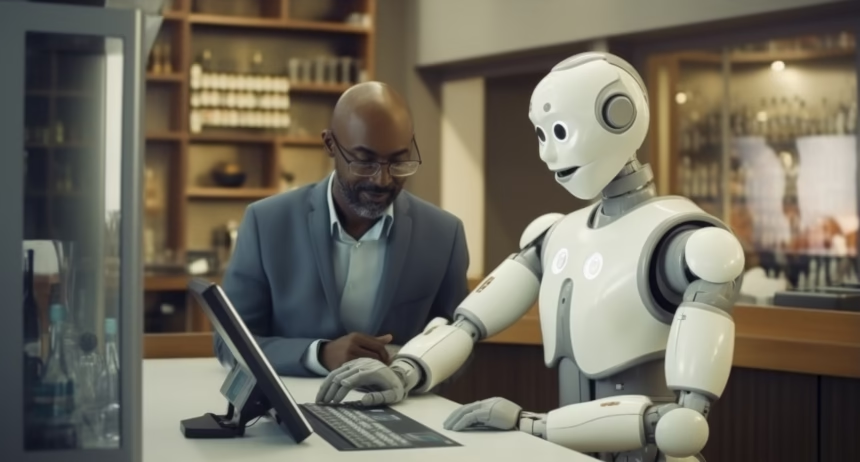As artificial intelligence keeps getting smarter, many wonder if machines will soon take over their roles. For digital marketers, social media managers, and content creators, staying ahead in this changing world is crucial. AI is no longer just a futuristic concept — it’s here, transforming how we work every day. The big question is: will AI replace your job, or can it help you do it better? In this article, we’ll explore what AI can do now, its future potential, and how you can prepare for 2025.
The Current State of AI in Digital Marketing
How AI Is Changing Digital Campaigns
AI is supercharging how brands run their ads. It can automatically place ads where they’ll get the most attention. Plus, AI adjusts bids in real time, so every naira spent delivers more results. Companies use AI-driven tools to analyze data and target the right customers with precision. Big platforms like Google Ads and Facebook Ads now rely heavily on AI to improve campaign performance. Programmatic advertising makes ad buying faster and smarter, automating decisions that once took days.
AI’s Role in Content Creation and Curation
Creating content used to mean hours of writing and editing. Now, AI tools generate social media posts, product descriptions, and even blog snippets in seconds. Natural Language Processing (NLP) helps machines understand human language, making their writing more natural. Tools like Jasper or Copy.ai become virtual assistants that suggest or draft content for campaigns. Additionally, algorithms sort through vast amounts of info to personalize feeds and recommend content, keeping audiences engaged.
How AI Powers Data Analysis
AI is a game-changer for understanding customer behavior. It can analyze data in real time, spotting trends and predicting what customers want next. Marketers can see which campaigns are working instantly, adjusting strategies on the fly. This speeds up decision-making and boosts return on investment. Industry reports show that over 75% of companies have already adopted AI for analytics, making it a must-have tool in any marketer’s toolkit.
Will AI Replace Human Roles in Digital Marketing?
Tasks AI Likely Will Automate
Some routine jobs are already getting automated. Creating reports, scheduling social posts, or doing keyword research can be handled by AI. Virtual assistants can prepare basic content, freeing up time for more strategic work. Tasks like split testing or managing simple ad campaigns are also prime for automation. Basically, any repetitive task that follows clear rules can be tackled by machines.
Jobs Less Likely to Be Replaced
Many parts of marketing rely on human touch. For example, shaping brand stories, crafting creative campaigns, or managing client relationships still need a human hand. Building emotional connections with audiences or negotiating deals remains a very human skill. These tasks involve intuition, empathy, and complex decision-making that machines won’t fully replicate anytime soon.
What Industry Experts Say
Some leaders see AI as a helper, not a replacement. Others warn it could cause job shifts. Many reports agree AI will take over routine work but will create new roles that focus on strategic thinking and creativity. The key is to adapt and grow alongside the tech rather than fight it.
Preparing for an AI-Driven Future in 2025
Skills to Develop Now
If you want to stay relevant, focus on skills AI can’t easily imitate. Creativity, storytelling, and emotional intelligence will become even more valuable. Building a deep understanding of branding and customer experience also helps. Consider courses in content strategy, digital storytelling, or data analysis to boost your skill set.
Using AI to Your Advantage
Instead of fearing AI, learn how to use it. Incorporate AI tools into your daily workflow to boost productivity. For instance, use AI to generate ideas or automate reports, freeing your time for more creative tasks. Many agencies and brands are already benefiting from AI, showing it’s a valuable ally. Evaluate different tools based on your needs and test how they fit into your routines.
Also Read: What ChatGPT Can and Can’t Do for Your Brand in 2025
Building a Future-Ready Career
Stay curious and keep learning. New roles will emerge, like AI ethics advisor or automated content strategist. Developing a niche or personal brand gives you a unique edge and makes your skills more valuable. Also, maintain a network of industry contacts to stay aware of new trends and job opportunities.
Ethical Challenges and Obstacles
Data Privacy and Security
Using AI means handling lots of customer data. Laws like GDPR and CCPA highlight the importance of protecting this information. Respect privacy and only use data responsibly. Avoid practices that could hurt your reputation or lead to legal trouble.
Bias and Fairness in AI
AI algorithms learn from existing data, which can carry bias. Campaigns might unintentionally alienate some audiences if these biases aren’t checked. Regularly review your tools and data sources to minimize unfair outcomes. Transparency and testing are key.
Authenticity and Trust
Automation risks making marketing seem impersonal. Customers value genuine connection. Brands that balance automation with human interaction will build stronger trust. Sharing real stories and engaging authentically keeps audiences loyal, even with AI involved.
The Road Ahead: Trends for 2025
New AI Technologies on the Horizon
Expect more voice search optimization and conversational AI, making interactions with brands more natural. Video marketing will become more AI-driven, with tools creating personalized clips or immersive AR experiences. AI in AR/VR will make online shopping and brand experiences more interactive and fun.
What It Means for You
Skills will shift. You might become a specialist in creating AI-enhanced campaigns or managing AI tools. New career paths will pop up—like virtual influencer manager or AR content creator. The secret? Stay flexible, keep learning, and be open to change.
Conclusion
AI is growing fast. It can automate routine tasks and help analyze data, but it can’t replace your creativity, empathy, and strategic thinking. To succeed in 2025, focus on developing human skills that machines can’t mimic. Use AI as a tool to boost what you do best. Keep learning, adapt quickly, and stay connected to industry trends. The future belongs to those ready to embrace technology without losing sight of their unique human touch.





